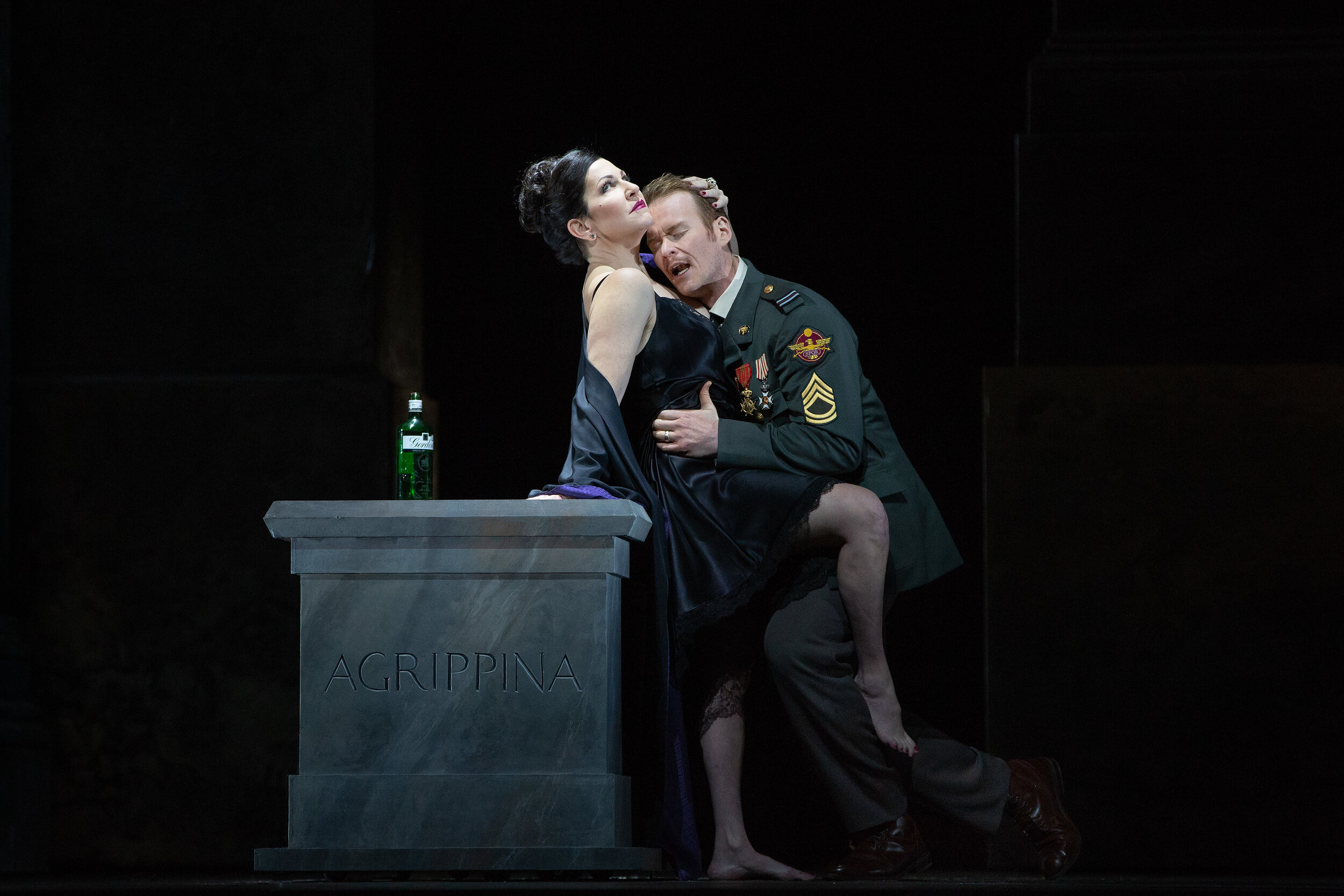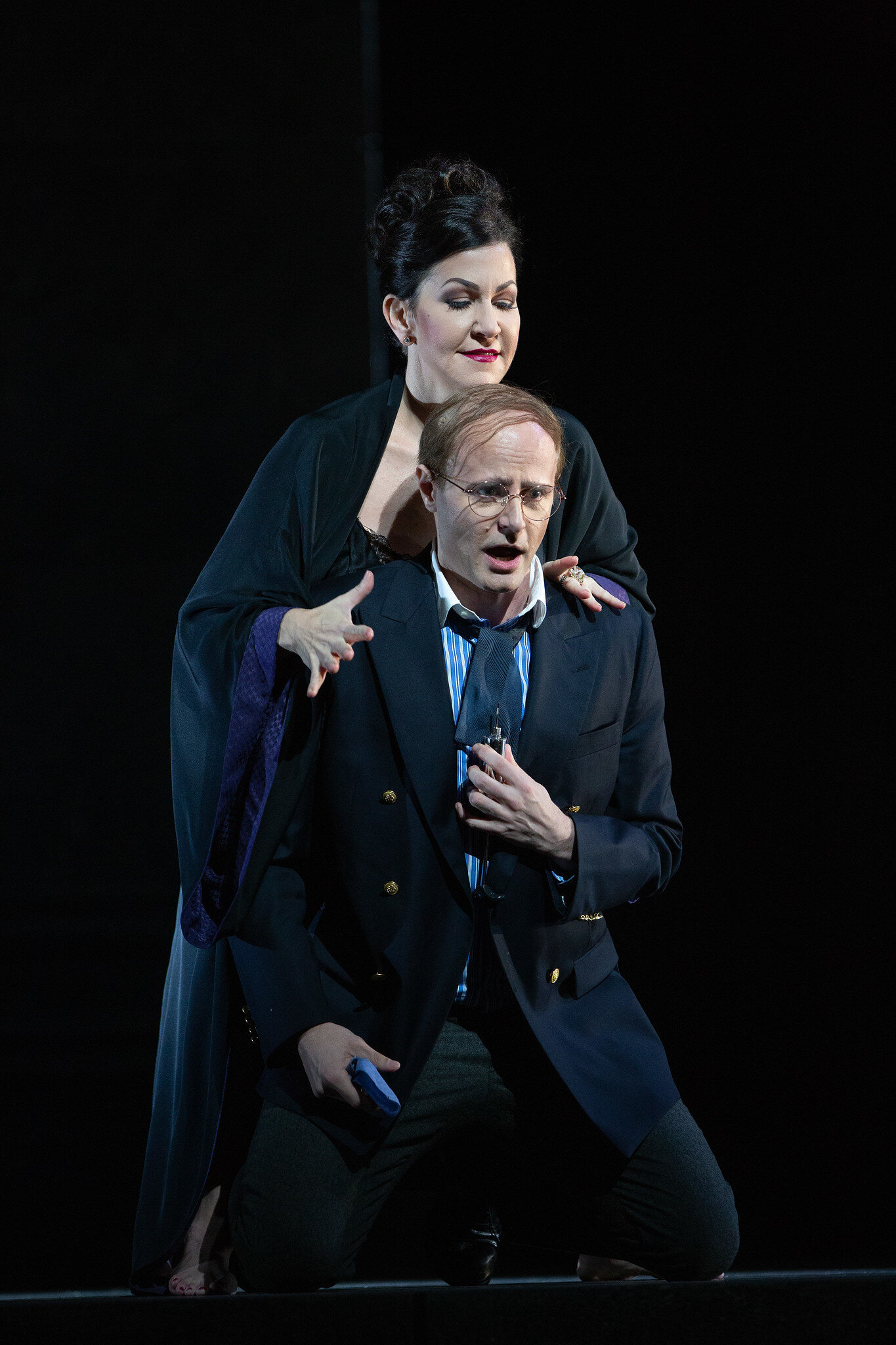Agrippina early on says, “Blessed are those who use deceit to rule,” and it’s wink-of-the-eye funny. Met Opera’s Agrippina is opera’s version of Stanley Kubrick’s “Dr. Strangelove”.
Joyve DiDonato as Agrippina. Photo by Paola Kudacki; courtesy of the Metropolitan Opera.
Ok, got your attention? Most modernized versions of operas advertise themselves as having themes still relevant to modern day. Agrippina, composed by George Frederic Handel in 1709, practically grabs you by the throat with its power games, sexual politics, and unbridled ambitions…just like today, except the opera, a drama per musica, is comedic; the Messiah’s composer was obviously a complicated man. Mainly because I love listening to mezzo-sopranos Joyce DiDonato and Kate Lindsey, I watched the Met Opera video recording of its 2020 production, and I watched it cold; I did not know the plot, nor had I heard the music previously. I knew from my mostly forgotten Roman history that the characters in the opera are actual historical figures, and so, I was rather expecting a tragedy. The story line is fictional, and the opera is cleverly staged. The ending caught me completely by surprise. The music is sublime, but it helps if you like baroque opera, at least a little; Agrippina gives you over three hours’ worth. This is the oldest opera presented by the Met. In days of old, to help you get through three to four hours of opera, you could eat, drink, and chat with friends during the performance, but humorless composers (I’m talking to you, Richard Wagner) finally did away with those options; happily, streaming opera returns those advantages.
PBS is playing the Met’s Agrippina in its Great Performances at the Met series – in DC, you can see a broadcast on WETA on Sunday, June 21 at 2:30 pm; I also discuss other ways to see it in The Fan Experience section below. My advice is to stop reading now and enjoy the opera’s plot freshly unfold. Then, return here afterwards to compare your thoughts to mine.
Agrippina cast photo. Photo by Marty Sohl; courtesy of the Metropolitan Opera.
Although the characters are historical figures from mid first century AD Rome, the satire was designed to take potshots at Venetian leaders of its day. The librettist and developer of the plot, Cardinal Vincenzo Grimani, was not only a priest, he also was a theater impresario and a viceroy of Naples. He gave Handel one of the best librettos he would ever have to orchestrate, and at only 24 years of age, he was up to the task. Agrippina was the German-born Handel’s second and last opera composed during his stay in Italy, and it premiered in Venice; it was an immediate success, Handel’s first opera success. His next opera, Rinaldo (1711), was also a success and premiered in London where Handel relocated for the remainder of his life. In addition to orchestral works and oratorios, he composed over forty operas, all with Italian librettos. Interestingly, Handel’s operas fell out of favor for over 200 years; Agrippina was in hiatus from 1719 until 1943. His operas reentered the repertoire in the second half of the 20th century and are currently enjoying a rebirth of interest in the US and Europe.
A moment of motherly love between Nerone (Kate Lindsey) and Agrippina (Joyce DiDonato). Photo by Marty Sohl; courtesy of the Metropolitan Opera.
Agrippina the Younger was a Roman empress known for being ambitious and ruthless. Grimani’s story revolves around Agrippina’s attempts to have her son Nerone (Nero; Handel uses the Italian version of the Roman names) placed in line to ascend to the throne when her husband Emperor Claudio dies. She enlists military man Pallante and politician Narciso in her deadly plots, and when initially Claudio intends to give the throne to his rescuer Ottone, she ensnares Ottone’s lover Poppea in her plan to block that move, which then set off a series of darkly comedic counterplots. In the end, everyone gets what they want for a happy ending, except we know the unhappy history of what came after. Thus, the opera’s surprise is that the joke is on us.
Agrippina (Joyce DiDonato) ensnares Poppea (Brenda Rae) in her plot. Photo by Marty Zohl; courtesy of the Metropolitan Opera.
Several aspects of this production, which got rave reviews when performed, stand out. First, the plot is brought to modern day with carefully thought-out cleverness by director Sir David McVicar. He felt that the story is timeless and fits especially well with what is going on in seats of power around the world currently. He wanted to keep the audience firmly rooted in present day. Next, he used cartoon style characters and simple staging to focus on emotions and the motivations of the different characters. He first produced this staging in Europe twenty years ago. One of his interesting updates to that production is changing Poppea to be more assertive, another impact in response to #MeToo. In staging, each character has a statue base with their name on it used as props throughout. He uses a nightclub scene where Bradley Brookshire delivers some fine harpsichord playing on stage and also an apartment scene with two closets; who is behind door number one? Door number two? And a mobile stairway leading up to a golden throne. Suggestive, no? This is the graphic novel version of Agrippina, and it works to both add comedic effects and engage us in the darker undercurrents. Honestly, at first, I thought the cartoonishness was silly, but then, I found myself becoming absorbed in the drama and realized Mr. McVicar knew what he was doing, and more was afoot than entertainment.
Iestyn Davies as Ottone. Photo by Marty Sohl; courtesy of the Metropolitan Opera.
To handle the music, the Met brought in a baroque music expert, Harry Bicket, to conduct a Met Orchestra ensemble, from the harpsichord no less. The music is excellent. Concerns that baroque opera was too intimate for cavernous opera houses the size of the Met were ill founded, and watching by videotape, you can adjust the sound to your liking. Baroque operas allow for creativity in staging since the stories are mainly set to allow each singer to have the stage for themselves a few times to show off their voices and singing ability. Handel filled Agrippina with beautiful arias; he even included some of his best from earlier works. There is also dancing to keep your interest from wavering.
left photo: Agrippina (Joyce DiDonato ensnares Pallante (Duncan Rock) into her plot. right photo: Agrippina (Joyce DiDonato ensnares Narcisco (Nicholas Tamagna) in her plot. Photos by Marty Sohl; courtesy of the Metropolitan Opera.
Speaking of arias, Joyce DiDonato plays the role of Agrippina with devilish charm and sexuality. At one point, she places her hand in Nabiso’s crotch while he is seated beside her with official papers covering up said action; he agrees to give her what she wants. Her acumen for baroque singing has been praised before and is amply displayed here. Her second act aria, “Pensieri voi me tormenta” where she sings of her determination to make her son emperor even though events have gone against her is a show stopper. If narcissists experience torment, this aria could be their anthem, and the close-ups allowed by videotaping let us enjoy Ms. DiDonato’s expressions missed by attending in person. She radiates will and determination.
Poppea (Brenda Rae) ensnares Nerone (Kate Lindsey) in her own plot. Photo by Marty Sohl; courtesy of the Metropolitan Opera.
Agrippina also serves as a showpiece for the enormously talented Kate Lindsey who plays Nerone as a young, scary, tattooed narcissist, barely in control of himself. I have had the opportunity to see Ms. Lindsey perform twice in DC (WNO’s Dead Man Walking and WCO’s Sapho). In the first instance, I did not think she quite lived up to her billing, but in the second she owned the stage. I recently saw her performance in the Met’s Les Contes d’Hoffman on video and saw her talent as an actress come into focus. In Agrippina, she is difficult to take your eyes from, turning in a beautiful singing performance as well as an amazing physical performance; at one point she sings while doing a full arm extended side plank! This is a performance you will remember.
Nerone (Kate Lindsey), the wanna be emperor in a photo op, stands atop his plinth handing out food to the poor, of course wearing gloves so that he doesn’t actually have to touch them. Photo by Marty Sohl; courtesy of the Metropolitan Opera.
As if that wasn’t enough, soprano Brenda Rae plays Poppea, a more assertive, awoke Poppea, who is also a schemer. Her beautiful coloratura adds a different layer of enjoyment to this performance, and her comedic acting stands up to that of Ms. DiDonato and Ms. Lindsey, especially in the bar scene. This was Ms. Rae’s first appearance at the Met; I previously saw her in 2018 as Lucia in Opera Philadelphia’s Lucia di Lammermoor. This is a powerful female triumvirate.
Agrippina (Joyce DiDonato) watches husband Claudio (Matthew Rose) practice golf; what other modern leaders that we know play golf? Photo by Marty Sohl; courtesy of the Metropolitan Opera.
Countertenor Iestyn Davies as Ottone, countertenor Nicholas Tamagna as Narciso, baritone Duncan Rock as Pallante, and bass Matthew Rose as Claudio all gave enjoyable comedic and vocal performances. I will only single out Mr. Davies for comment. Mr. Davies plays Ottone with restraint, emphasizing Ottone’s sincerity, making him easily manipulated, but in fact that makes him the perfect foil for the remainder of the cast who are schemers. He also delivers several heart touching arias beautifully.
Agrippina and Sir McVicker’s staging, something old enlivened by something new, are a marriage made in heaven, or at least in the Lincoln Center, the opera equivalent of heaven. While many programs on TV and the movies portray dystopian futures, Agrippina gives us a view of our dystopian past, while Mr. McVicker reveals it to be very much like our dystopian present.
The Fan Experience: Agrippina played at the Met earlier this year before it was closed by the pandemic. Public Television is playing Agrippina as part of its Great Performances at the Met series. In some areas, it has already played. In the Washington DC area, it will be broadcast on WETA TV on Sunday, June 21 at 2:30 pm. It’s Father’s Day; you might want to set it to record or just watch it with Dad. The opera is in Italian with English subtitles.
Agrippina is also part of Met Opera’s On Demand collection. “Met Opera On Demand” can be accessed by subscription; a seven-day free trial is offered. The operas can be played on computers and mobile devices and on smart TVs using Apple TV, Roku, and other such devices. The speakers I have attached to my TV are good ones, but I prefer linking my AirPods to Apple TV and listening that way.










